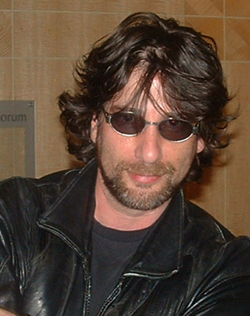In the aftermath of the Violet Blue episode and in the midst of the PZ Myers controversy, racism reared it’s ugly head in the SF community. Aspiring SF writer Luke Jackson published a rejection letter written by an editor for Helix, William Sanders, in which was said :
“I’m impressed by your knowledge of the Q’uran and Islamic traditions. (Having spent a couple of years in the Middle East, I know something about these things.) You did a good job of exploring the worm-brained mentality of those people – at the end we still don’t really understand it, but then no one from the civilized world ever can – and I was pleased to see that you didn’t engage in the typical error of trying to make this evil bastard sympathetic, or give him human qualities. {…] the narrator seems to be saying that it was this incident which caused him to take up the jihad, but he’s being mendacious (like all his kind, he’s incapable of honesty). […] most of the SF magazines are very leery of publishing anything that might offend the sheet heads’
Unfortunately the letter was deleted in fear of a lawsuit threatened by Sanders. Putting the ethics about publicly posting a rejection letter aside, this is one that needed to be seen. Author Tobias Buckell has a great post on his blog summing it up. In an interesting development writer Yoon Ha Lee got a taste of Helix editor Sanders professionalism after asking to remove her story:
“Sanders flounced off in a huff, stating that the story ‘never did make any sense’ and that he only accepted it to ‘please those who admire your work’-what altruism!-‘and also because (notorious bigot that I am) I was trying to get more work by non-Caucasian writers.’ If I were a writer currently submitting to Helix, I would kind of worry about that bit-all things considered, if a story really does suck, I’d rather have it rejected so I can fix it.
He then played psychic and claimed that I only asked for the story to be withdrawn ‘because, let’s get real here, you feel the need to distance yourself from someone who is in disfavor with the kind of babbling PC waterheads whose good opinion is so important to you, and whom you seem to be trying to impress with this little grandstand play.’ He closed with: ‘There was a suggestion I was going to make, but it is probably not physically practicable.’
After that he pulled the story and replaced it with these professional words: “Story deleted at author’s pantiwadulous request.”
Sanders is now demanding anyone who wants their stories removed from Helix to pay forty bucks!
(See also: Tobias Buckell: “Asimov’s Forum Ickiness”, Buckell: “Keeps Digging”, K. Tempest Bradford: “William Sanders, Senior Bigot, Helix”)





